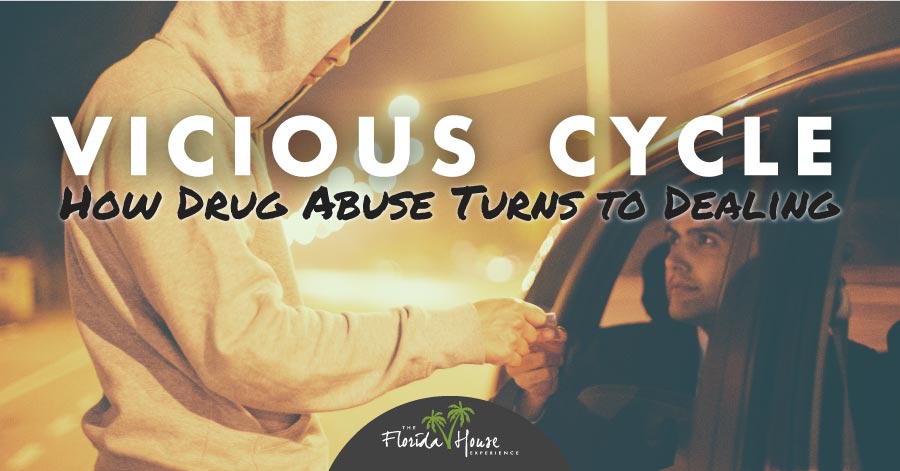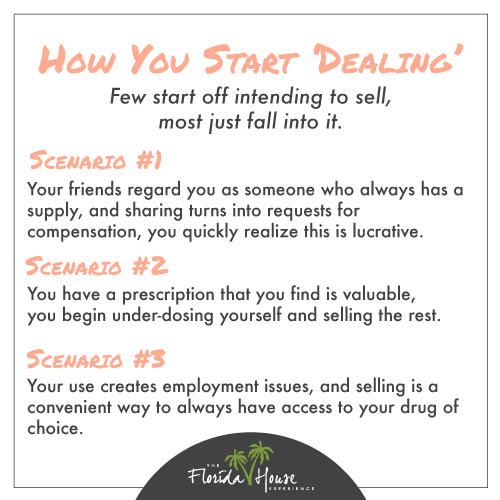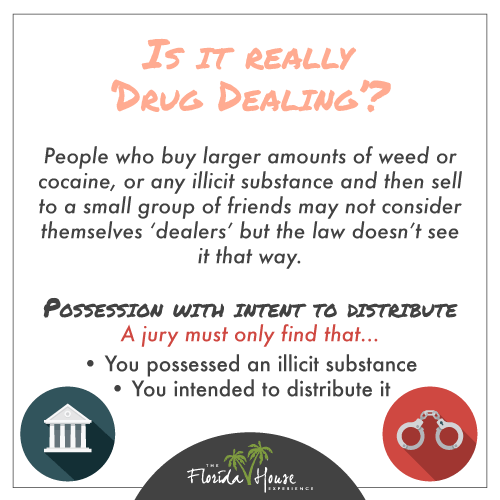
Drug addiction often starts slowly, with a little sampling at a party or prescription use that spirals out of control. For those who enjoy the initial rush, use may increase, spreading from getting high solely at parties or during nights out to daily doses, perhaps at night to unwind or in the morning to get going. It’s possible to remain high-functioning for a little while, but balancing school, work and family life with a steadily increasing addiction to drugs or alcohol means it won’t be long before things start to slide.
In many cases, the first thing to suffer is employment, leading to an expensive habit and no way to fund it. As such, turning to drug dealing may become the only way out for those deep in addiction.
Employment and Drug Use
 Despite the importance of holding a steady job under all circumstances, this can become a catch-22 of sorts for drug users: Employment is needed to fund a drug habit, but a drug habit is often incompatible with high-paying employment. Most jobs, especially professional careers that require skills and knowledge to complete, can’t be performed up to desired standards while under the influence. For employees working in warehouses or in other locations in which breaks are scheduled and shifts are rigidly structured, there isn’t always time to procure or use adequate substances throughout the day to fend off withdrawal, leading to poor performance and skipped shifts.
Despite the importance of holding a steady job under all circumstances, this can become a catch-22 of sorts for drug users: Employment is needed to fund a drug habit, but a drug habit is often incompatible with high-paying employment. Most jobs, especially professional careers that require skills and knowledge to complete, can’t be performed up to desired standards while under the influence. For employees working in warehouses or in other locations in which breaks are scheduled and shifts are rigidly structured, there isn’t always time to procure or use adequate substances throughout the day to fend off withdrawal, leading to poor performance and skipped shifts.
When addiction deepens, a dose or two a day may not be enough; heroin users, for example, may feel a strong urge to use every few hours. The same is true for alcoholics, with alcohol metabolizing at an average rate of 0.015 grams per 100 milliliters per hour. Many fields have zero-tolerance drug and alcohol policies, and evidence of substances in the workplace or positive drug tests can lead to immediate termination.
Regardless of career path or previous performance, drug use will eventually compromise employment, leaving users with an expensive habit and nowhere else to turn.
The Appeal of Drug Dealing
Chronic substance use isn’t cheap, even in low-cost areas of the country. Cocaine averages around $60 a gram, and those deep in addiction may take as many as 10 to 20 grams a day. Alcoholics may spend $20 to $50 on a handle of liquor or several cases of beer a day, and heroin addicts can expect to spend between $5 and $20 per bag with an average use of around five bags per day. Regardless of a drug of choice, these amounts add up, costing potentially hundreds per day and thousands per month.
Without a job, it’s almost impossible to sustain these expenses, and as the adage goes, desperate times call for desperate measures. This can make drug dealing, to make money and to cover personal use, a compelling opportunity.
The Cost of Drug Dealing
 After months or years of purchasing substances from dealers, getting into dealing becomes a tempting option. With connections in the industry, so to speak, most regular users have sources or know other dealers who could use a helping hand. Some substances, like marijuana, can be personally grown and sold, while others, like meth, can be produced at home, albeit dangerously. Others, however, have to be sourced from a supplier, and that can be a dangerous game.
After months or years of purchasing substances from dealers, getting into dealing becomes a tempting option. With connections in the industry, so to speak, most regular users have sources or know other dealers who could use a helping hand. Some substances, like marijuana, can be personally grown and sold, while others, like meth, can be produced at home, albeit dangerously. Others, however, have to be sourced from a supplier, and that can be a dangerous game.
Drug dealing isn’t as easy as it appears on the surface. Adequate supply often means contact with potentially dangerous members of organized crime groups, particularly for substances like cocaine and heroin. This can increase participation in illegal acts and may lead to other choices, like robbery and illegal weapons. Further, working with drug users can be a serious game in its own right. Many regular drug users are also involved in criminal activities and can become aggressive or hostile when drugs are unavailable. There’s also no way to compel drug users to hand over money when a deal goes sideways — it’s not like dealers can go to the police to report a theft.
In spite of all this, the danger and loss potential isn’t the biggest cost — it’s the potential legal ramifications. Forty-six percent of those in federal prisons were involved in drug-related charges. While this can include simple possession — a misdemeanor or low-level felony in most areas — it more often involves possession with intent to distribute, which carries a much harsher sentence. While state laws vary, a minimum federal sentence is five years, with sentences as long as 20 years when higher quantities are found. In Florida, the story is the same, with possession-with-intent charges carrying anywhere from five to 15 years. A personal amount of marijuana, on the other hand, can garner just a small fine and either a short stint in jail or community service, depending on the state.
Regardless of the place of residence, getting caught dealing drugs will almost always result in a felony charge, multiple years in prison and a life turned upside down. A felony charge makes it harder to hold down a steady job, rent a home or even vote. Going to prison can also ruin a credit score if any debt can’t be repaid and more than likely will strain personal relationships.
Drug Dealing and Rock Bottom
For those who choose to deal drugs, hitting rock bottom often becomes a worse fate. With the legal consequences of dealing far exceeding those of simple possession, the fall is much harder when using turns to distribution.
In an ideal world, getting help before things fall apart is the best course of action, but this isn’t always realistic. Rock bottom, or the lowest point in addiction, is different for everyone, but dealing drugs carries some of the largest ramifications. And getting in this deep may not be the end, particularly for those who got too wrapped up in the lifestyle. Nearly 70 percent of drug offenders go on to offend again, with drug trafficker recidivism at around a rate of 50 percent.
These kinds of patterns can make getting help harder, particularly for those who have committed to dealing and aren’t in a healthy mindset. Prison time can make relapse more difficult to avoid, too, due to the stressful circumstances on the inside. Tragically, only 11 percent of those who need help pursue it in a prison environment.
Getting involved in drug dealing while in a cycle of abuse may sound like a great way to fund a habit, but in reality, it’s among the worst choices for drug users. Drug dealing leads to a dangerous lifestyle, harsher criminal penalties, a likelihood of a life-changing felony conviction and a decreased chance of getting help. Instead, seeking support from a treatment center like FHE Health should be the next logical step — a choice that could ultimately save your life.






